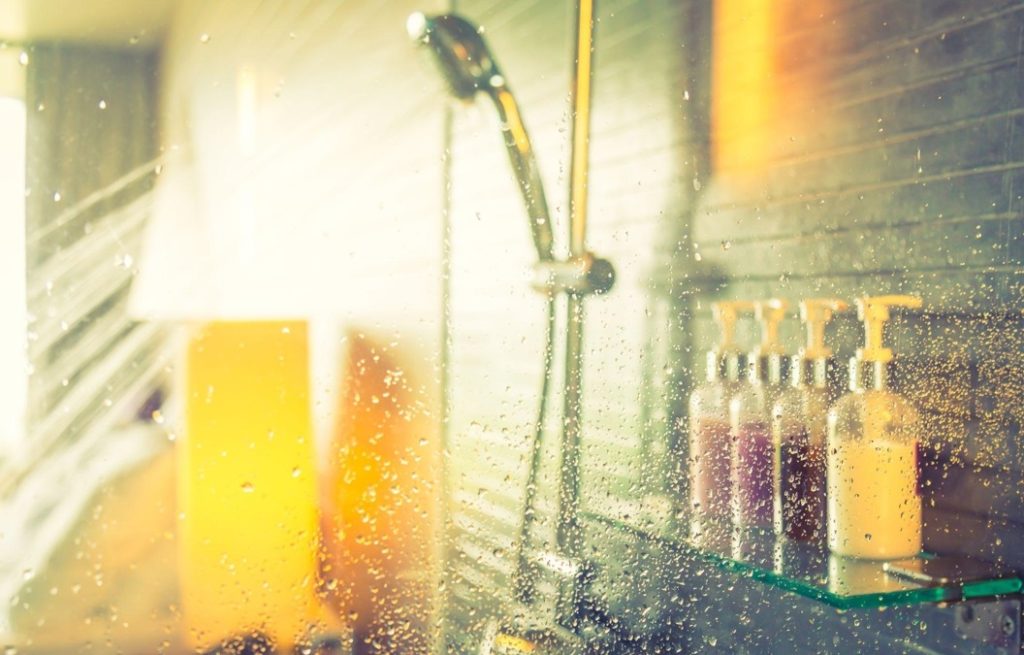If you’ve recently moved to a new home or renovated your bathroom, chances are you have experienced a change in water pressure and quality.
While the water quality may not be better or worse, the way water is treated in every town and city can be very different. How the water travels through your home’s water supply pipes can also make a difference in the water quality.
This is important for water’s potability in your home and water quality in your shower. Hard water deposits can leave you with dry, irritated skin and brittle hair.
A soft water filter can help relieve any brittleness that develops from hard water. Installation is easy; anyone can add a soft water filter to their shower.
We’ll review how a soft water inline shower filter works and impacts your hair and skin.
Difference Between Hard Water and Soft Water

Hard water is a common problem in many parts of North America. Heavily mineralized water can cause problems for your skin and hair. Why is this? Since hard water is heavy in minerals, it deposits those minerals on anything it touches.
If you’ve moved to a new home, you may have noticed your cleaning products, like dish soap and laundry detergent, changed in their effectiveness. This may not be because of the detergents but because of the hard water running into your home.
While both hard and soft water are clear and look and taste similar, their content is different, and there are advantages to either.
Hard Water
Hard water is due to how water is treated and its heavy mineral contents. This can be good because water contains nutrients like calcium and magnesium. However, excess nutrients can dry out your skin over time.
Hard water also forms from traveling in the community water system. Older pipes will contain limescale buildup, which travels into the water and forms hard water. This affects your drinking water, shower water, and home appliances.
Your home’s pipes, sinks, toilets, dishwasher, and washing machine can degrade faster because of hard water buildup. Mineral deposits can also clog up your pipes and cause further plumbing issues.
Soft Water
Soft water requires a water softening system, which works to reduce and remove harmful contaminants from hard water. This type of water will contain lower calcium, magnesium, and other hard minerals than hard water. Soft water tends to have a higher concentration of sodium than hard water, an essential mineral your body needs to stay hydrated.
You can tell if you have soft water in your home by noticing a healthy lather when washing your hands or clothes or a healthy water pressure when you run your tap water. You may notice drinking water has a slightly salty taste to it because of the sodium content in soft water.
How Do Water Softeners Work?

If you want a soft water filter for your shower, it’s easy to install on your own with minimal tools. Most shower filters are just a matter of replacing the existing shower head and ensuring the filter is changed every few months.
Water softeners have multiple parts: a built-in filter (some may have multiple filters) and the shower head itself. As water travels from the water pipe to the shower head, the water passes through the shower head filter.
Here, the filter removes hard water minerals like limescale and mineral deposits and traps them so clean, soft water passes through and comes out of the shower head. These filters should be replaced over time, as they no longer can hold more mineral deposits, so their filter quality weakens over time.
If you installed a water softener a few months ago and are noticing the quality of your water change, it’s most likely time to replace the filter. Luckily, this is easier than the initial installation and just involves putting in a few filters and disposing of the old one.
Do Shower Filters Reduce Water Pressure?
It is a common myth that shower filters will reduce water pressure. Some shower heads have adjustable settings to change the water pressure, but the filter itself will not change the water pressure. The pressure will remain the same as a regular shower head, typically 10 L per minute.
How Often Should I Replace a Soft Water Filter?
Depending on how often you use the shower head, a soft water filter should be replaced every three to six months. As the filter collects and traps hard water minerals, it becomes less effective the longer you use it. Generally, it’s recommended to wait no more than every six months.
Best Soft Water Filter for Shower
If you’re looking for the best soft water inline shower filter to install on your shower head, we offer the Jolie Showerhead Filter. This shower head filter provides the two most effective filter mediums for a clean shower, KDF-55, and calcium sulfite.
Both works to remove chlorine and heavy metals that dry out your skin and hair, including other contaminants in your water. KDF can significantly reduce the amount of chlorine, limescale, and impurities in your water. Effectively filtering these contaminants out means you can have a cleaner shower without worrying about dry skin and brittle hair.
It’s also easy to install a water softener shower head, and in just a few steps, you can enjoy a durable product made to last in your bathroom.


